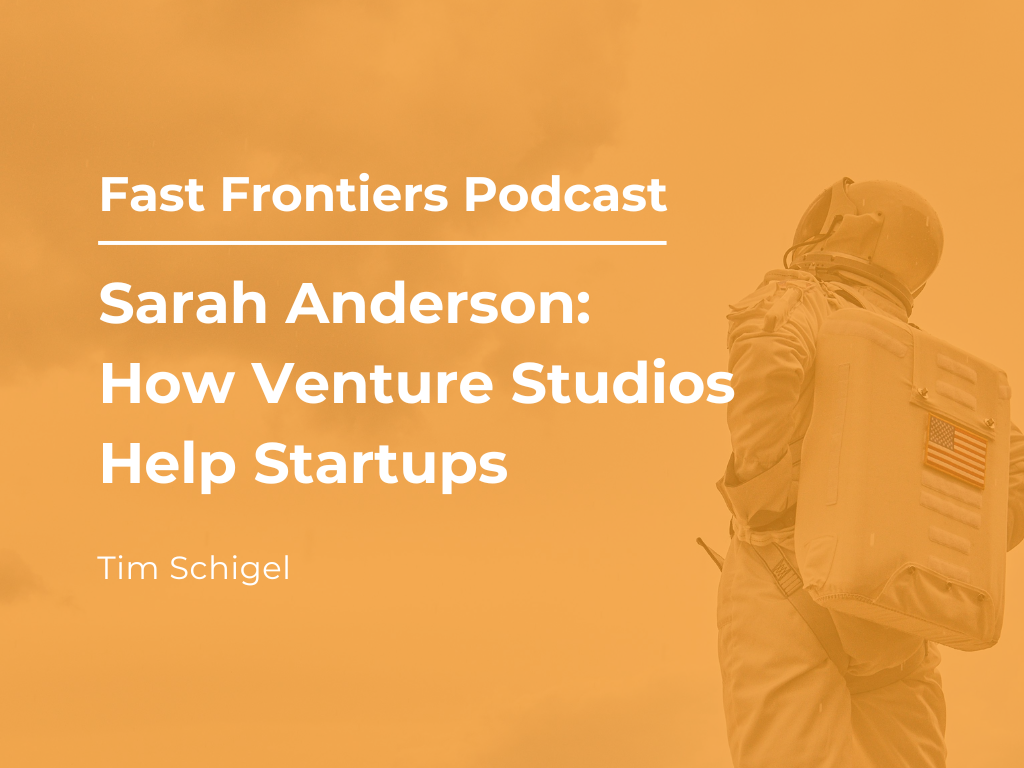Sarah Anderson—the founding partner of Vault Fund—joined us on the Fast Frontiers Podcast recently. Vault Fund is self-ascribed as “a fund of funds manager focused on the best global venture studios and formation funds, [which] seeks to invest in entities that act as founders for multiple startups, from idea formation and company creation to scale.”
I’ve had the pleasure of working with Sarah since we started collaborating in 2013 while launching Cintrifuse. And I have also been fortunate to watch her grow and thrive in the venture world ever since.
Sarah attended the University of Florida, where she was an NCAA pole vaulter, a hobby that she continues to do to this day—but more on that later. After working in the investment banking world on the west coast—with RBC, Royal Bank of Canada and JP Morgan—and dealing in the tech and media industry, Sarah moved her family back to Cincinnati, where her husband was originally from.
We sat down with Sarah to talk about venture studios and to hear about why this up-and-coming category is such a unique and viable way to start companies today. According to its website, the Vault Fund lists itself as “a fanatical champion of visionary founders that see the future.” This forward-thinking focus aligns directly with our podcast and vision at Refinery Ventures.
Talent Can Be Found Anywhere
With venture studios—and Vault Fund in particular—it’s all about empowerment and vision and having an impact on the world, one startup at a time. And who is being empowered? The founders.
The foundation of venture studios is built upon the belief that talent and capability can be found anywhere—not just where there are big pockets to supply seed money—and that talent deserves to be given a chance to build something outstanding.
The modern venture studio model dares to buck the trend of traditional venture capital methods in this way, and it’s seeing encouraging results. This model has shown us that by facilitating the zero-to-one stage company creation, backing experienced hypergrowth entrepreneurs with domain expertise can be the most rewarding venture investing. But we’ll let Sarah tell you more about how this all works.
Getting Started with Venture Studios
Sarah first shared how her time at Cintrifuse (where all of the investors were large corporations) helped open her eyes to a whole new approach to investing. “We work[ed] very hard alongside those corporations to help them with their innovation strategies. And one of the key theses that we were testing at Cintrifuse was, by connecting these corporations with the venture investors themselves, instead of doing individual pilots with startups, they were able to see across a much broader landscape of innovation, startups, categories, and really help that innovation effort become more efficient.”
From that experience came a small “seed” of inspiration, which has since taken root. Sarah shared that she started “making a big push into the venture studio landscape back in 2018 [and] 2019,” with the first venture studio that she met being Atomic Labs. What especially impressed her was their capabilities around their use of the zero-to-one build model. Their performance also blew her away, which in her own words, “really stood out among the pipeline of traditional venture funds we were looking at the time.”
Seeing this was the start of it all for Sarah, providing that little push she needed to explore this landscape more. And explore she did.
“We probably talked to at least 20 or 30 studios to try to get a sense for who had really strong expertise working with corporations because it’s not super easy to work with corporations all the time. … Having that experience and those partnerships and understanding how those teams work was really important,” Sarah explained.
And all of that exploration took patience. “We were also looking at which venture studio partners would align really well with some of the core businesses among our LPs, to kind of plug into that bench of talent that they needed. But we took our time, really landscaped the industry over the next two or three years, and made a couple of commitments,” Sarah explained.
How Can Venture Studios Help Entrepreneurs?
Venture studios are not yet a household name or concept in the VC world, and Sarah herself admits that “the definitions around venture studio, depending on who you talk to, will be different, [and] the spectrum is very broad.” So we asked her to shed some light on how entrepreneurs, in particular, should think about venture studios.
According to Sarah, “Entrepreneurs can create studios. Instead of doing one thing, they’re doing a whole portfolio of things.” Whereas, on the other hand, “typically, a founder that might have an idea or expertise in a specific category or interest in a specific category would align with a studio that is currently working in that space. They would come in, early days or a little bit later after the idea is baked, but that studio helps them as a co-founder [and] takes care of a lot of the non-visionary things that go into early days of developing a company.”
She further explained: “They do the nuts and bolts around programming, development, user experience, testing, leading indicators, unit economics, all of the back-office finance, getting legal docs set up. They’ll even do BD, sales work, early partnerships, things like that.”
In summary, a founder wants to take a company that’s already “kind of baked and scale it.” Sarah shares that founders “have to think about the studio a little bit differently. [With studios], they’re coming in as a co-founder, but a later stage co-founder.”
Sounds great, right? So, why haven’t more people sighed on to the venture studio model? Sarah offered her take: “I think one of the reasons that you don’t see more institutional investors participating in this category is because it really hasn’t aligned structurally on a specific kind of context. I think it takes a long time to understand some of these venture studio structures and the cash inflows outflows, how decisions are made.”
But, the good news is that the tide is shifting, and as more VCs begin to understand venture studios—and see all of the benefits that adopting them can bring—a whole new frontier lays wide open for discovery. And we are glad Sarah and Vault are here to help us navigate it. For more insights and advice from Sarah, listen to the full podcast.



